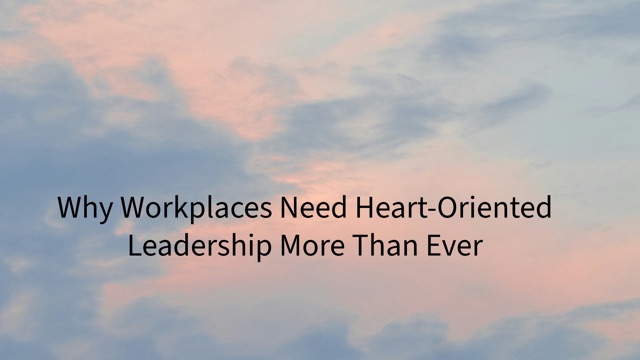Leading with Heart: Why Workplaces Need Heart-Oriented Leadership More Than Ever

Leading with Heart: Why Workplaces Need Heart-Oriented Leadership More Than Ever
In an era of rapid technological acceleration, environmental collapse, political division, and collective burnout, we are witnessing the limits of a purely intellect-driven, profit-oriented, leadership model. It is no longer enough to lead with strategy alone. What today’s world urgently requires is a new form of leadership—Leading with Heart: heart-oriented leadership ,rooted in empathy, humility, emotional intelligence, and a deep sense of interconnectedness.
The Crisis of Disconnection
Despite all our advancements, many leaders remain disconnected, from their employees, from themselves, and from the deeper needs of the communities they serve. This disconnection leads to decisions that prioritize short-term gains over long-term wellbeing, control over collaboration, and appearances over authenticity. We see the results everywhere: rising mental health issues, disillusioned employees, distrust in organizations, and a lack of moral courage at critical turning points.
The world is not suffering from a lack of intelligence. It’s suffering from a lack of compassion.
What Is Heart-Oriented Leadership?
Heart-oriented leadership does not mean soft or passive. It is a courageous kind of leadership that integrates emotional intelligence, relational depth, and ethical responsibility into decision-making. It listens before it acts. It values people over performance metrics, presence over posturing.
Heart-led leaders understand that vulnerability is not a weakness but a gateway to trust. That humility is not self-doubt but a sign of maturity. And that leadership is not about having all the answers, but about holding space for meaningful questions and collective wisdom.
Why Now?
1. We’re Leading Through Uncertainty:
In a volatile and unpredictable world, people crave emotional safety, not just strategic direction. Heart-oriented leadership creates cultures of trust where people feel seen, heard, and valued—a necessity for navigating complexity.
2. Burnout Is an Epidemic:
Today’s workforce is exhausted. The old “push through at all costs” mindset no longer works. Leaders who model compassion, boundaries, and care enable healthier, more sustainable work environments.
3. The Next Generation Expects It:
Gen Z and Millennials are not inspired by titles—they’re drawn to authenticity. They want to work for people who lead with purpose, listen with empathy, and live their values.
4. The Planet Depends on It:
The climate crisis is not just a technical problem—it’s a moral one. Heart-centered leadership dares to consider the long-term consequences of today’s actions, not only for shareholders, but for future generations and the planet itself.
The need to Rehumanize Leadership
We cannot solve the challenges of our time with the same consciousness that created them. The next evolution of leadership is not more mastery over systems, it is deeper mastery of the self. Heart-oriented leadership doesn’t abandon intelligence, it integrates it with soul, with conscience, and with care.
To lead with heart is not a luxury. It is a necessity.
It’s how we repair trust.
How we inspire hope.
How we shape a future worth leading.
